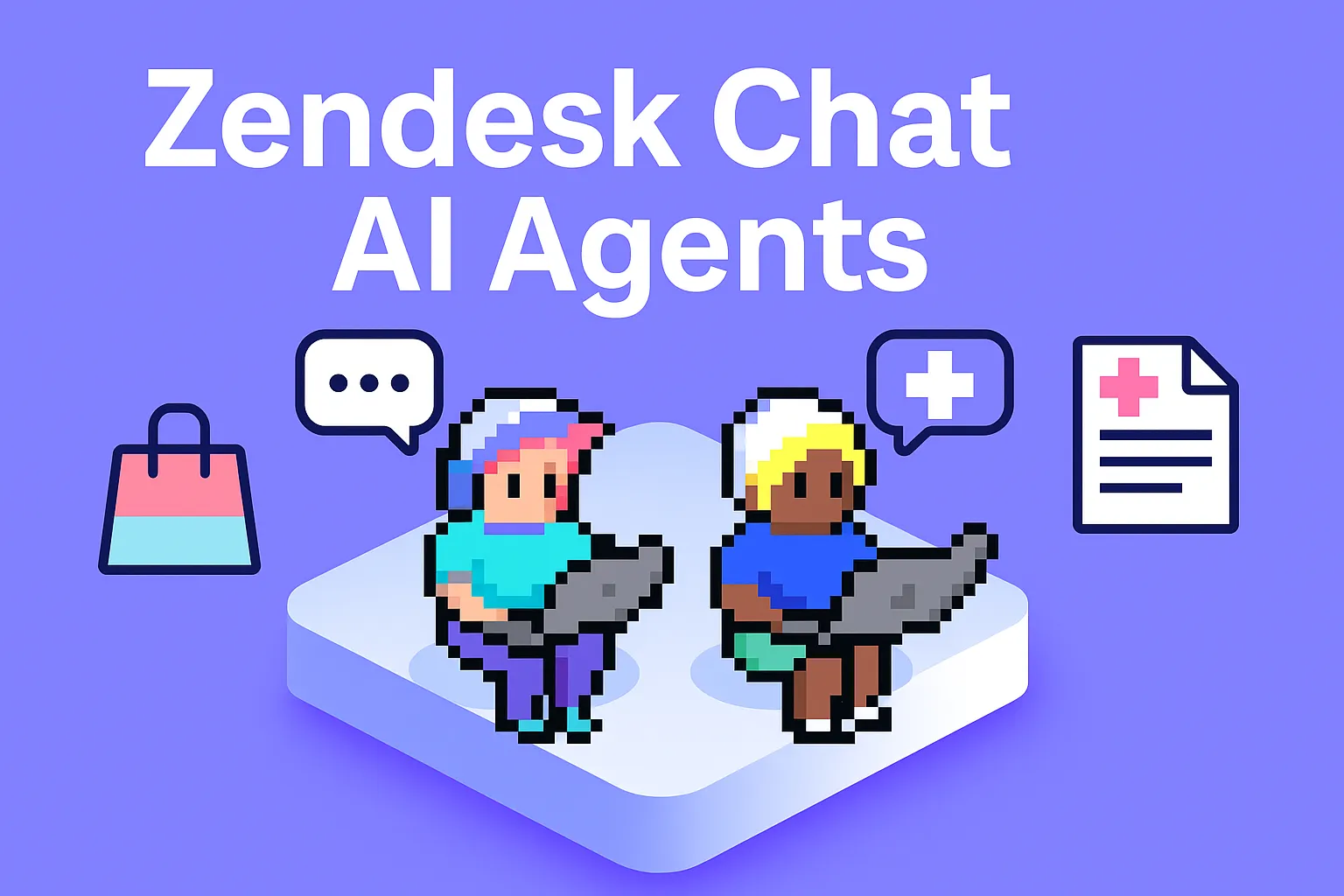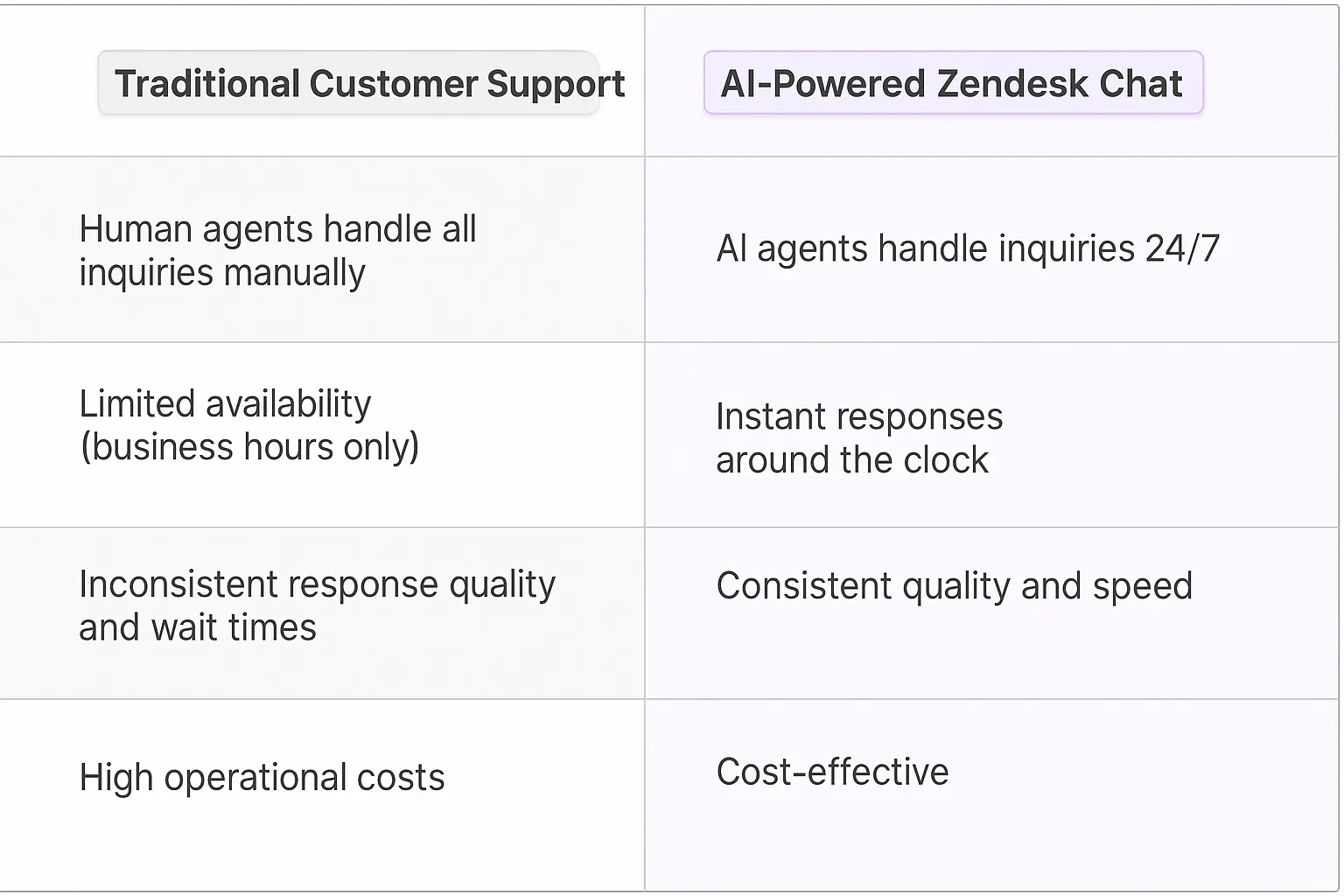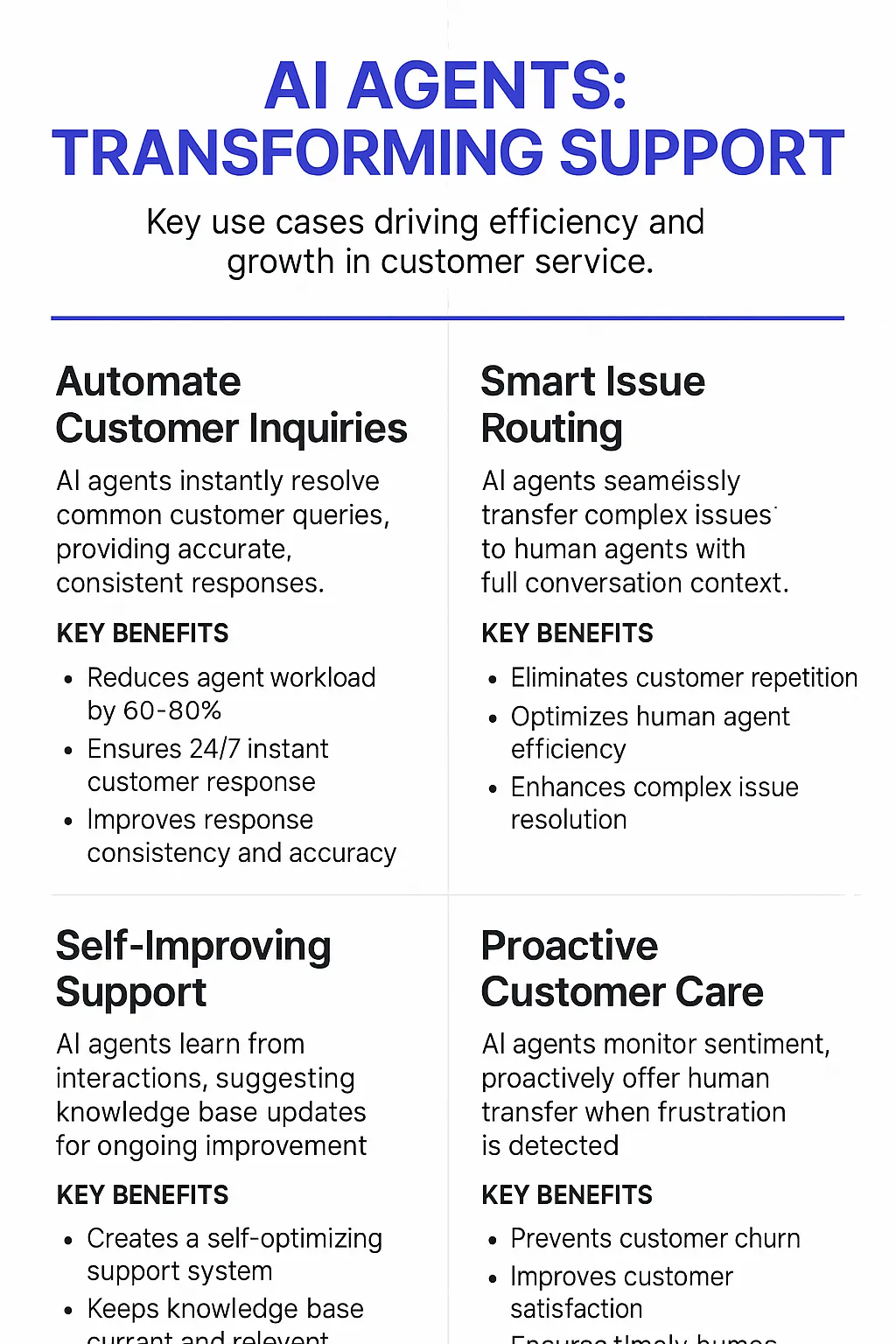Zendesk Chat AI Agents
Understanding Zendesk Chat
Zendesk Chat is a powerful live chat software that enables businesses to connect with customers in real-time across multiple channels. It's designed to provide seamless, personalized customer support experiences. With Zendesk Chat, companies can engage visitors on their website, mobile app, or social media platforms, offering instant assistance and proactive support.
Zendesk Chat comes packed with features that elevate customer support:1. Real-time visitor monitoring: Track visitor behavior and engage proactively.2. Customizable chat widget: Tailor the chat interface to match your brand.3. Automated triggers: Set up rules to initiate chats based on specific conditions.4. Analytics and reporting: Gain insights into chat performance and customer satisfaction.5. Integration capabilities: Seamlessly connect with other tools in your tech stack.6. Mobile SDK: Embed chat functionality directly into your mobile apps.7. AI-powered chatbots: Automate responses to common queries and streamline support workflows.

Benefits of AI Agents for Zendesk Chat
What would have been used before AI Agents?
Before AI agents entered the scene, Zendesk Chat relied heavily on human agents to handle customer inquiries. This meant long wait times, inconsistent responses, and the constant challenge of scaling support teams to meet demand. Companies often found themselves in a Catch-22: hire more agents to improve response times, or maintain smaller teams at the cost of customer satisfaction. It was a classic example of the human bandwidth problem in customer support.
The traditional setup also meant that simple, repetitive queries consumed a disproportionate amount of human agents' time. This not only led to agent burnout but also prevented them from focusing on more complex, high-value interactions where human empathy and problem-solving skills truly shine.
What are the benefits of AI Agents?
Enter AI agents for Zendesk Chat, and we're looking at a paradigm shift in customer support dynamics. These digital teammates are not just glorified chatbots; they're sophisticated systems that can understand context, learn from interactions, and provide nuanced responses.
First off, AI agents bring scalability to a whole new level. They can handle thousands of conversations simultaneously, effectively eliminating wait times. This is a game-changer for businesses experiencing rapid growth or seasonal spikes in customer inquiries.
But it's not just about quantity; it's about quality too. AI agents ensure consistency in responses, adhering to company policies and best practices without fail. They don't have bad days, they don't get tired, and they're available 24/7. This level of reliability can significantly boost customer trust and satisfaction.
Moreover, AI agents excel at data processing and pattern recognition. They can quickly sift through vast amounts of information to provide accurate answers, something that would take human agents considerably longer. This speed and accuracy can lead to faster resolution times and improved first-contact resolution rates.
Perhaps most importantly, AI agents free up human agents to focus on what they do best: handling complex issues that require empathy, creativity, and critical thinking. This not only leads to more fulfilling work for human agents but also ensures that customers receive high-touch support when they need it most.
Lastly, the data gathered by AI agents can provide invaluable insights into customer behavior, common issues, and emerging trends. This wealth of information can drive continuous improvement in products, services, and support strategies.
In essence, AI agents in Zendesk Chat are not replacing human agents; they're augmenting and enhancing human capabilities. They're creating a new model of customer support that's more efficient, more scalable, and ultimately more human. It's a classic example of technology not just automating tasks, but fundamentally changing how we approach problems and deliver value.

Potential Use Cases of AI Agents with Zendesk Chat
Processes
AI agents in Zendesk Chat are game-changers for customer support. They're not just glorified chatbots; they're digital teammates that can handle complex interactions and learn from each conversation. These agents can manage entire support processes, from initial triage to resolution, freeing up human agents for high-value tasks.
One killer process is automated ticket routing. The AI agent analyzes incoming chats, determines the nature of the issue, and routes it to the right department or specialist. This cuts down on transfer times and gets customers to the right person faster. It's like having a super-smart receptionist who never takes a coffee break.
Another process ripe for AI enhancement is knowledge base management. The agent can continuously scan chat logs, identify common issues, and automatically update the knowledge base with new solutions. This creates a self-improving system that gets smarter with every interaction, reducing the need for manual updates and ensuring customers always have access to the latest information.
Tasks
When it comes to specific tasks, AI agents in Zendesk Chat are Swiss Army knives. They can handle a wide range of activities that traditionally eat up human agents' time.
One standout task is sentiment analysis. The AI can read between the lines of customer messages, detecting frustration, confusion, or satisfaction. This allows for real-time adjustments in tone and approach, ensuring each customer feels heard and understood. It's like giving every agent an emotional intelligence superpower.
Another key task is predictive issue resolution. By analyzing patterns in customer inquiries, the AI can anticipate follow-up questions and proactively provide information. This reduces the back-and-forth in chats and speeds up resolution times. It's not mind-reading, but it's pretty close.
Language translation is another task where AI agents shine. They can seamlessly translate conversations in real-time, allowing agents to support customers in multiple languages without the need for separate language teams. This opens up global markets without the overhead of multilingual staff.
AI agents can also handle data entry and ticket creation. They can extract relevant information from chat conversations and automatically populate CRM fields or create detailed support tickets. This ensures accurate record-keeping without the tedium of manual data entry.
The potential of AI agents in Zendesk Chat is massive. They're not replacing human agents; they're augmenting them, handling the routine so humans can focus on the exceptional. As these digital teammates continue to evolve, we'll see support teams becoming more efficient, more scalable, and more capable of delivering truly personalized customer experiences. The future of customer support isn't just automated - it's intelligently augmented.

Industry Use Cases
The versatility of AI agents in Zendesk Chat makes them valuable across various industries. Let's dive into some meaty, industry-specific use cases that showcase how AI can transform workflows and processes. These aren't your run-of-the-mill examples; we're talking about real, tangible impacts that are reshaping how businesses operate.
From e-commerce to healthcare, we're seeing AI agents in Zendesk Chat punch above their weight class. They're not just answering simple queries anymore; they're becoming integral parts of complex business ecosystems. Think of them as digital teammates that never sleep, constantly learning, and always ready to tackle the next challenge.
What's particularly exciting is how these AI agents are adapting to the unique nuances of each industry. They're not one-size-fits-all solutions, but rather chameleons that can speak the language of finance one minute and switch to tech support the next. This adaptability is what's driving their adoption across sectors that you might not expect.
So, let's roll up our sleeves and explore how these AI agents are making waves in different industries. We'll look at the problems they're solving, the efficiencies they're creating, and the new possibilities they're opening up. Trust me, by the end of this, you'll be seeing AI agents in a whole new light.
E-commerce: Elevating Customer Support with Zendesk Chat AI Agents
The e-commerce landscape is a battlefield of conversion rates and customer retention. Every interaction counts, and that's where Zendesk Chat AI Agents come into play. These digital teammates aren't just glorified chatbots; they're the front-line soldiers in the war for customer satisfaction.
Let's break it down: An online fashion retailer implements Zendesk Chat AI Agents to handle the influx of customer inquiries. These AI-powered entities don't just regurgitate FAQs; they're parsing through vast amounts of data in real-time, from inventory levels to shipping statuses, even factoring in weather delays.
The magic happens when a customer asks about the fit of a particular dress. The AI agent doesn't just provide generic size information. It analyzes the customer's purchase history, compares it with similar body types in the database, and offers personalized recommendations. "Based on your previous purchases and customers with similar preferences, you might find the medium fits you best, but consider sizing up if you prefer a looser fit around the waist."
This level of personalization creates a flywheel effect. Customers feel understood, leading to higher conversion rates. The AI learns from each interaction, continuously improving its recommendations. It's a virtuous cycle that compounds over time, turning customer service from a cost center into a revenue driver.
But here's the kicker: These AI agents aren't replacing human staff. They're augmenting them. By handling routine inquiries and providing data-driven insights, they free up human agents to tackle complex issues that require empathy and nuanced understanding. It's not about man vs. machine; it's about creating a symbiotic relationship that elevates the entire customer experience.
In the e-commerce arena, where margins are tight and competition is fierce, Zendesk Chat AI Agents aren't just a nice-to-have. They're becoming as essential as your payment gateway or your logistics partner. They're the silent workhorses that keep your customer satisfaction scores high and your churn rates low. And in a world where customer experience is the new battlefield, that's a competitive edge you can't afford to ignore.
Healthcare: Zendesk Chat AI Agents as Digital Triage Nurses
The healthcare industry is ripe for disruption, and Zendesk Chat AI Agents are leading the charge. These aren't your grandma's chatbots - they're sophisticated digital triage nurses that are reshaping patient care from the ground up.
Let's dive into a real-world scenario: A large hospital network implements Zendesk Chat AI Agents on their patient portal. These AI entities aren't just scheduling appointments or answering basic questions. They're performing complex symptom analysis, cross-referencing patient histories, and even factoring in local health trends.
When a patient reports chest pain, the AI doesn't just spit out a generic "seek immediate medical attention" response. It digs deeper. It asks about the nature of the pain, duration, associated symptoms. It checks the patient's history for risk factors like hypertension or diabetes. It even considers recent local flu outbreaks or air quality reports that could be relevant.
Based on this analysis, the AI might determine that the symptoms align more closely with acid reflux than a cardiac event. It provides immediate, personalized advice: "Your symptoms suggest acid reflux rather than a heart issue. Try taking an antacid. If symptoms persist for more than an hour or worsen, please come to the ER immediately."
This isn't just about convenience - it's about saving lives and optimizing resources. By providing accurate triage, these AI agents reduce unnecessary ER visits, allowing medical staff to focus on critical cases. They're not replacing doctors; they're augmenting the entire healthcare ecosystem.
But here's where it gets really interesting: These AI agents are learning machines. Every interaction improves their diagnostic capabilities. They're constantly updated with the latest medical research and local health data. Over time, they become increasingly accurate at initial assessments, potentially catching serious conditions earlier than traditional methods.
The network effects here are profound. As more hospitals adopt this technology, the collective knowledge grows exponentially. It's like having a global team of expert diagnosticians available 24/7, continuously learning and improving.
In healthcare, where every second counts and resources are always stretched thin, Zendesk Chat AI Agents aren't just a nice addition - they're becoming as crucial as stethoscopes or MRI machines. They're the silent guardians that keep emergency rooms focused on true emergencies and help patients get the right care at the right time.
This is the future of healthcare - not cold, impersonal robots, but intelligent digital teammates working alongside human medical professionals to create a more efficient, effective, and ultimately more humane healthcare system. It's a future that's already here, and it's only going to get more interesting from here on out.
Considerations and Challenges for Zendesk Chat AI Agents
Implementing AI agents for Zendesk Chat isn't just a plug-and-play solution. It's a complex endeavor that requires careful planning and execution. Let's dive into the nitty-gritty of what you'll need to consider and the hurdles you'll face.
Technical Challenges
First up, the tech stack. You're not just dealing with a simple chatbot here. We're talking about sophisticated AI that needs to understand context, sentiment, and nuance. This requires robust natural language processing (NLP) capabilities, which aren't trivial to implement.
Data integration is another beast. Your AI agent needs access to a wealth of information - customer histories, product details, FAQs, and more. Ensuring seamless data flow between your AI agent and various backend systems is crucial but can be a significant technical challenge.
Then there's the issue of scalability. As your customer base grows, can your AI agent handle the increased load without breaking a sweat? You'll need to design your system architecture with scalability in mind from day one.
Operational Challenges
On the operational front, training your AI agent is a major undertaking. It's not just about feeding it data; it's about teaching it to understand your brand voice, product nuances, and customer expectations. This requires a dedicated team and ongoing effort.
Monitoring and quality control are also critical. How do you ensure your AI agent is performing up to par? You'll need robust analytics and feedback mechanisms in place to continuously improve its performance.
Let's not forget about the human element. Integrating AI agents into your existing customer service workflow can be tricky. You'll need to retrain your human agents to work alongside their digital teammates effectively. This isn't just a technical challenge; it's a change management issue that requires careful handling.
Ethical Considerations
Ethics in AI isn't just a buzzword; it's a real concern. How do you ensure your AI agent isn't biased in its responses? What about data privacy and security? These are thorny issues that need to be addressed head-on.
Transparency is key. Customers should know when they're interacting with an AI agent. But how do you communicate this without eroding trust or satisfaction? It's a delicate balance that requires thoughtful implementation.
Implementing Zendesk Chat AI agents is no walk in the park. It's a complex, multifaceted challenge that touches on technology, operations, and ethics. But for those who get it right, the payoff in terms of improved customer service and operational efficiency can be substantial. Just remember, it's not about replacing humans; it's about augmenting their capabilities to deliver superior customer experiences.
Embracing the AI-Powered Future of Customer Support
Zendesk Chat AI Agents are not just a technological advancement; they're a paradigm shift in customer support. These digital teammates are redefining how businesses interact with customers, offering scalability, consistency, and intelligence that was previously unattainable. From e-commerce to healthcare, AI agents are proving their worth by handling complex tasks, providing personalized experiences, and freeing up human agents for high-value interactions.
However, implementing AI agents isn't without challenges. Technical hurdles, operational considerations, and ethical concerns need to be carefully navigated. But for businesses willing to invest the time and resources, the payoff can be substantial. Improved customer satisfaction, increased efficiency, and data-driven insights are just the tip of the iceberg.
As we look to the future, it's clear that AI agents will play an increasingly crucial role in customer support. They're not replacing human agents but augmenting them, creating a symbiotic relationship that elevates the entire customer experience. In a world where customer satisfaction can make or break a business, Zendesk Chat AI Agents aren't just a nice-to-have - they're becoming as essential as any other core business tool.













